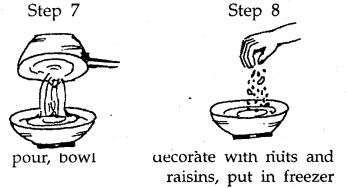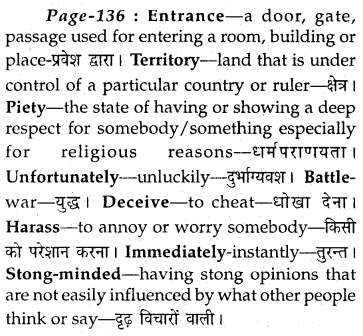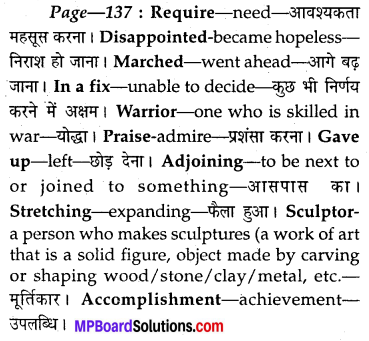Students who are in search of Class 8th English Solutions can use MP Board Solutions for Class 8th English Chapter Wise Pdf. So, if you follow MP Board Class 8th Special English Textbook Solutions you can cover all the topics in Chapter 15 Ahilyabai – A Great Indian Queen Questions and Answers. First check in which chapter you are lagging and then Download MP Board Solutions for Class 8th English. English is the scoring subject if you improve your grammar skills. Because most of the students will lose marks by writing grammar mistakes. So, we suggest you to Download MP Board Class 8th English Solutions according to the chapters.
MP Board Class 8th Special English Solutions Chapter 15 Ahilyabai – A Great Indian Queen
Check out the topics covered in Chapter before you start your preparation. Improve your grammar skills with the help of MP Board Class 8th English Chapter 15 Ahilyabai – A Great Indian Queen Questions and Answers pdf links. The solutions for MP Board Class 8th English Textbook are prepared by the English experts. This helps to improve your communication skills.
Ahilyabai – A Great Indian Queen Textual Exercise
Ahilyabai A Great Indian Queen Class 8th Chapter 15 Word Power
Solve the crossword puzzle with the help of the clues given. These words have been used in the lesson:
Clues:
Left to right
1. a door or gate
4. land that is under the control of a ruler
5. men, women and children
6. to help a particular person by giving him money
8. the state of having deep respect for God and religion

Downwords
2. To be next to or joined to something
3. a company or business
7. a person who makes figures by carving or shaping wood
Class 8 English Chapter 15 Ahilyabai A Great Indian Queen Comprehension
Answer the following questions:
Mp Board Class 8 English Chapter 15 Question 1.
Who taught Ahilyabai?
Answer:
Ahilyabai’s father taught her.
Class 8 English Chapter 15 Question 2.
Where did Malhar Rao first see Ahilyabai?
Answer:
Malhar Rao first saw Ahilyabai at Chondi at the temple service in the village.
Ahilyabai Place Was Situated At Class 8th Chapter 15 Question 3.
When did Ahilyabai’s husband die?
Answer:
Ahilyabai’s husband died in 1754.
Ahilyabai Holkar Class 8th Chapter 15 Question 4.
What did Gangadhar suggest to Ahilyabai after the death of her son?
Answer:
Gangadhar suggested Ahilyabai to adopt a son when her own son died.
Ahilya Bai Class 8th Chapter 15 Question 5.
What was Ahilyabai’s reply to her Chief Minister?
Answer:
Ahilyabai replied to her Chief Minister that she didn’t require his advice, as she could look after the state very well.
Lesson 15 Ahilyabai A Great Indian Queen Class 8th Question 6.
What message did Ahilyabai send to Raghoba Dada?
Answer:
She sent a message to Raghoba Dada that as soon as he dared to cross the river Kshipra, he would have to fight her army.
Ahilyabai Palace Was Situated At Class 8th Chapter 15 Question 7.
Why did Raghoba Dada give up the idea of fighting and went back?
Answer:
Raghoba Dada was afraid that if he lost a battle against a woman, he would lose his name and fame as a warrior on the other hand, nobody would praise him even if he won the battle. Hence, he gave up the idea of fighting and went back
Mp Board Class 8 English Book Solution Chapter 15 Question 8.
What did Ahilyabai build and renovate? Write atleast five names.
Answer:
Ahilyabai built and renovated a number of temples, ghats, wells, tanks and rest houses.
- The Vishwanath temple of Varanasi
- The Vishnupad temple of Gaya
- Ghats
- Wells
- Tanks
Ahilyabai Holkar Death Reason Class 8th Chapter 15 Question 9.
Ahilyabai was not only a great ruler but a great human being also.’ How do you know?
Answer:
Ahilyabai Cared for the poor in her state. She heard every complaint in person. Craftsmen, sculptors, and artists-all received due respect in her state.
Question 10.
Fill in the blanks with the correct answer to complete the sentence.
(i) Ahilyabai’s palace was situated at…
(a) Chondi
(b) Indore
(c) Maheshwar
(d) Beed
(ii) Ahilyabai’s husband’s name was…
(a) Malhar Rao
(b) Mankaji
(c) Gangadhar
(d) Khande Rao
Answer:
(i) c. Maheshwar
(ii) d. khande Rao.
Let’s Learn
Question 1.
Read the following sentences carefully:
- Great deeds are remembered even after hundreds of years.
- Ahilyabai’s husband was killed in a battle in 1754.
- Ahilyabai is remembered with love and respect in all parts of the country.
We often prefer passive when the subject of a sentence is not important.
Also observe changes in the main verb.
For example the active voice form of sentence No. 1 given above will be:
People remember great deeds even after hundreds of years.
When changed to passive form; ‘remember’ becomes ‘remembered’ and ‘are’ is added before it; in sentence No. 3 ‘is’ is added. That is because of the number of the subject.
Now write the following sentences without the agent. (Passive Voice)
- Somebody built this house in 1986.
- We clean this room everyday.
- Somebody cleaned this room yesterday.
- People don’t use this road very often.
- They cancelled all flights because of fog.
- Last night someone broke into our house.
- They don’t pay Mohan very much.
Answer:
- This house was built in 1986.
- This room is cleaned everyday.
- This room was cleaned yesterday.
- This road is not used very often.
- All flights were cancelled because of fog,
- Our house was broken out last night.
- Mohan is not paid very much.
2. We often use ‘can’ expressing possibilty or ability to do something.
Example: I can speak four languanges.
- The negative is ‘can’t. (cannot)
- Could is the past form of can.
- We use could’ for general ability in the past. But if we talk about what happened in a particular situation, we use ‘was/were able to…or managed to ……….
Example:
- A house caught fire yesterday but everybody was able to escape.
- Raju was an excellent football player. He could beat anybody.
But negative ‘couldn’t’ is possible in all situations.
Now complete the sentences using can/ could/can’t/couldn’t
- Mohan belongs to a well educated family. He ……………… Speak English very well.
- My uncle was a very intelligent man. He ……………… speak five languages.
- I looked for the book everywhere but I ……………… find it.
- Monica ……………… drive but she hasn’t got a car.
- I can’t meet you on Saturday but I ……………… meet you Sunday evening.
- My grandmother loved music. She ……………… play the piano very well.
- Mala wasn’t at home when I phoned but I ……………… contact her at her office.
- I’m afraid. I ……………… come to your party.
Answers:
- can
- could
- couldn’t
- can
- can’t
- could
- could
- can’t
(C) We often use ‘will’ in these situations:
(i) offering to do something
Example: Is your trunk very heavy? I’ll help you.
(ii) When we decide to do something at the time of speaking.
Example: (a) What would you like to eat?
(b) I’ll have fruit, please.
(iii) Promising to do something
Example: I won’t tell any body what you have said.
(iv) Asking somebody to do something
Example: Will you shut the windows, please? ‘Would’ is used in these situations:
(i) offering an invitation
Example: Would you like a cup of tea?
(ii) ‘Would’ is the past form of ‘will’.
Example: I promised I wouldn’t go out.
Now complete the sentences with ‘will would/won’t/wouldn’t.
- ………….. you like tea or coffee? I …………. have coffee, please.
- You arranged to play football today. Now you decide not to play. You say. I don’t think I …………. play.
- You are on a bus. You have a seat but an elderly man is standing. You after him your seat. …………. you like to sit down?
- A friend of yours is interested in one of your books, you offer it. Friend: This book is very interesting. You: Yes, it’s very good …………. you like to borrow it.
- Did you phone Mona? Oh no, I forgot. I. …………. phone her now.
- Don’t worry about your exam. I’m sure you …………. pass.
- I’m sorry about what happened yesterday. It …………. happen again.
Answer:
- would, will
- would
- would
- would
- will
- will
- won’t.
Let’s Talk
Two students will come forward. Using the clues, they will ask questions and answer to each other using correct forms of the verbs:
A: you/go through/the lesson/?
B: Yes/Ahilyabai/do/marvellous work/
A: When/she/get/marry/?
B: Perhaps/at the age of 8 or 9.
A: How/old/she/when/her/ husband/die/?
B: She/29/.
A: She/afraid of /Raghoba Dada?
B: No/She/challenge/him/.
A: Sheldo/all the work/in her state only?
B: No/she/build/renovate/roads/ temples/over Indial.
A: Yes/she/was/great queen/?
B: Yes/she/was/.
Answers:
A: Did you go through the lesson?
B: Yes. Ahilyabai did marvellous work.
A: When did she get marry?
B: Perhaps she got married at the age of 8 or 9.
A: How old was she when her husband died?
B: She was 29.
A: Was she afraid of Raghoba Dada?
B: No, she challanged him.
A: Did she do all the work in her state only?
B: No, she built and renovate roads and temples all over India.
A: Yes, was she a great queen?
B: Yes, she was.
Let’s Read
Students! you must have seen the picture of an old lady, hardly five feet tall, with high check-bones, thin lips and a wrinkled face, clad in a white saree with a blue border covering the head. This is Mother Teresa often called the Gentle Mother’ or the ‘Angel of Mercy.’
Mother Teresa was born in Skopje, Macedonia on August 27, 1910. Her family was of Albanian descent. Her original name was Agnes Gonxha Bojaxhiu. At the age of eighteen, she renounced the world and joined the Loreto nuns in Ireland. She used to work from 4 a.m. to late at night. The dying in Kolkata, the wounded in Vietnam, the straving in Ethopia-all turned to this frail looking woman for support. She always embraced the needy and the suffering all over the world. The mission established by her is still busy in doing the same even after her death. She received a number of awards and distinctions, including the Pope John XXIII Peace Prize in 1971 and the Nobel peace prize in 1979.
Answer the following questions:
Question 1.
Why was Mother Teresa called the Angel of Mercy?
Answer:
Mother Teresa was called ‘the Angerl of Mercy’ because she embraced the needy and the suffering all over the world.
Question 2.
What do you understand by the word ‘renounced’? Explain.
Answer:
Renounced-It means to give up something.
Question 3.
Explain the phrase ‘frail looking woman.’
Answer:
‘Frail looking woman-Mother Teresa was very lean and thin.
Question 4.
Fill in the blank, choosing the correct word.
Mother Teresa’ was born in ……………………
(a) Ireland
(b) Kolkata
(c) Albania
(d) Macedonia
Answer:
Mother Teresa was born in Macedonia.
Question 5.
Which award did she get in 1971?
Answer:
She got the Pope John XXIII peace prize in 1971.
Question 6.
Write five adjectives occurring in the passage.
Answer:
Five adjectivies-high, thin, wrinkled, white and blue.
Let’s Write
Look at these pictures describing a recipe for a fruit custard. Read the clue words below the pictures. Write out the recipe listing the ingredients and the process of making fruit custard. Things you will need:

1 tablespoon of cornflour
3 cups milk
2 tablespoons sugar
1/2 teaspon vanilla
2 bananas
2 apples
2 pomegranates
1 pine apple
few grapes
few raisins and chopped nuts yellow colour


Begin like this:
Take milk in a saucepan and boil it.
Answer:
Add sugar and cornflour. Mix, and stir well till it turns into thick and creamy. Take it off. Let it cool. Then add some chopped fruits. Add vanilla drops and colour. Pour bowl. Decorate it with nuts and raisins and then put in freezer.
Ahilyabai – A Great Indian Queen Word Meanings


The main aim is to share the knowledge and help the students of Class 8th to secure the best score in their final exams. Use the concepts of MP Board Class 8th English Chapter 15 Ahilyabai – A Great Indian Queen Questions and Answers in Real time to enhance your skills. If you have any doubts you can post your comments in the comment section, We will clarify your doubts as soon as possible without any delay.